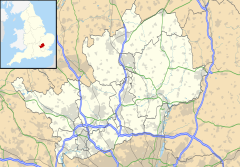| St Ippolyts | |
|---|---|
 St Ippolyts village sign | |
Location within Hertfordshire | |
| Population | 2,047 (2011 Census including Gosmore)[1] |
| OS grid reference | TL197270 |
| District | |
| Shire county | |
| Region | |
| Country | England |
| Sovereign state | United Kingdom |
| Post town | Hitchin |
| Postcode district | SG4 |
| Dialling code | 01462 |
| Police | Hertfordshire |
| Fire | Hertfordshire |
| Ambulance | East of England |
| UK Parliament | |
St Ippolyts (or St Ippollitts) is a village and civil parish on the southern edge of Hitchin in Hertfordshire, England. It has a population of approximately 2,000.
Governance
[edit]North Hertfordshire District Council
[edit]St Ippolyts is located within the local government district of North Hertfordshire and within the Ward of Graveley, St Ippolyts & Wymondley, a Multi Member Ward currently represented by two Liberal Democrat councillors (Cllr Dominic Griffiths and Cllr Caroline McDonnell).[2]
Hertfordshire County Council
[edit]St Ippolyts is located within the Hertfordshire County Council Division of Knebworth and Codicote and is represented by Cllr Richard Thake (Conservative).[3]
Parliamentary Representation
[edit]The Village is represented in Parliament by Alistair Strathern MP (Labour) who was first elected as the MP for Hitchin in 2024.
Geography
[edit]St Ippolyts is located in between the A602 (Stevenage Road) and the B656 (Codicote Road), 2 km (1.2 mi) south-east of Hitchin, Hertfordshire. It lies approximately 80 m (260 ft) above sea level in a gap in the Chiltern Hills.
Some features of the village are a 17th-century gabled house, a timber-framed house formerly known as the Olive Branch Inn, and a 16th-century house built around an even older timbered house.
Electrical grid substation
[edit]Wymondley grid substation is in the village, south of the A602. The village of Wymondley is next door, to the north-east, on the other side of the A602.
The substation is 78 acres, and eventually cost £7.5m, built by Howard Farrow Construction.
History
[edit]The name of St Ippolyts, although spelled in a variety of ways, is derived from St Hippolytus to whom the village church was dedicated. According to Daphne Rance in her book on the parish "St. Ippolyts: a country parish in the nineteenth century" (1987) at various times also known as Epolites, Pallets, Nipples or St Ibbs. In the same vein, the 1881 census mentions the following 28 place names, all of which are believed to refer to it: Iplits, Ipolits, Ipollitts, Ipollyts, Ipolytes, Ipolyts, Ippatyts, Ipplits, Ipployts, Ipplyts, Ippolett, Ippoletts, Ippolits, Ippolitss, Ippolits, Ippolitss, Ippolitts, Ippollit, Ippollits, Ippollitts, Ippollyts, Ippollytts, Ippololits, Ippolts, Ippolytis, Ippolyts, Ippolytts, Ippoplitts. The name of the parish was officially changed from St Ippollitts to St Ippolyts on 2 October 1996.[4] Even in the 21st Century, official road signs to the village on consecutive junctions on the nearby A602 show contradictory spellings of the village name.
St Ippolyts Church
[edit]
The church was built in 1087 in a beautiful setting on the hillside above the village. According to the church records, the building was funded by grants supplied by Judith de Lens, the niece of William the Conqueror. De Lens gave evidence against her husband Waltheof, a Saxon Earl, which led to his execution. The funding of the church was an attempt to make amends for this act. The church was rebuilt in the mid nineteenth century using old materials 'recycled' from the nearby abandoned Minsden Chapel. Apart from St Ippolyts, the church also serves the nearby villages of Gosmore and Langley.
The noted theologian Fenton John Anthony Hort (Fenton Hort) is amongst the former vicars of St Ippolyts church where he stayed for 15 years before taking up a fellowship and lectureship at Emmanuel College in Cambridge.
Politician George Lloyd, 1st Baron Lloyd (1879–1941) was buried in the churchyard,[5] as is Geoffrey Lane, Baron Lane (1918-2005), former Lord Chief Justice of England.
Almshoe
[edit]The ancient manor[6] of Almshoe, mentioned in the Domesday Book,[7] is located in the south of the parish. Almshoe Bury—now a farmhouse and wedding venue—is a grade I listed building.[8]
Nearby towns and villages
[edit]- Gosmore
- Great Wymondley
- Hitchin
- Kings Walden
- Little Wymondley
- Preston
- Stevenage
References
[edit]- ^ "Civil Parish population 2011". Neighbourhood Statistics. Office for National Statistics. Retrieved 29 October 2016.
- ^ "Election results 2024 | North Herts Council". www.north-herts.gov.uk. Retrieved 25 July 2024.
- ^ "Election results for Knebworth and Codicote (38), 6 May 2021". democracy.hertfordshire.gov.uk. 6 May 2021. Retrieved 25 July 2024.
- ^ Bulletin of Changes of Local Authority Status, Names and Areas, 1 April 1994–31 March 1997 (PDF). London: Department of the Environment. 1997. p. 10. Retrieved 31 August 2021.
District council notices of the change of name of a parish under section 75 of the Local Government Act 1972: Parish of St Ippollitts became St Ippolyts from 2 October 1996
- ^ Oxford Dictionary of National Biography, Volume 34. Oxford University Press. 2004. p. 127.
- ^ "Parishes: Ippollitts | British History Online".
- ^ "Almshoe [Bury] and [Little] Almshoe | Domesday Book".
- ^ "Almshoe Bury, St Ippolyts, Hertfordshire".
Further reading
[edit]- Rance, Daphne (1987). St. Ippolyts: a country parish in the nineteenth century. Egon Publishers Ltd. ISBN 0-905858-38-7.
- Rance, Daphne (1996). The Yeomen of Ippolyts. Cortney Publications. ISBN 0-904378-48-9.
